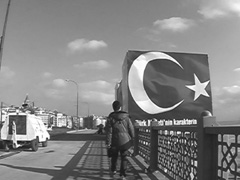Back Drop Kurdistan
 JAPAN, TURKEY, NEW ZEALAND / 2007 / Japanese, Turkish, English / Color / Video / 115 min
JAPAN, TURKEY, NEW ZEALAND / 2007 / Japanese, Turkish, English / Color / Video / 115 min
Director: Nomoto Masaru
Photography: Nomoto Masaru, Yamauchi Daido, Osawa Kazuo
Editing, Producer: Osawa Kazuo
Source: BDK Production Committee (Osawa Kazuo)
The Kurdish Kazankiran family, who came from Turkey to Japan claiming refugee status, sleep in front of the United Nations University as part of a demonstration and start petitions in a desperate move to obtain official refugee status. Although their appeal is initially approved, eventually the father and one of his sons are deported. While the director has been a “passive observer” until this point, he follows the family to Turkey in order to relieve his unfocused anger and questions. While speaking to the locals, he throws himself into a whir of theories regarding the relationship between “Turks,” “Kurds,” and Kurdish refugees, and reveals the nature of Kurdish identity in Turkey as being far removed from the “Kurdish Problem” seen in the news. The film’s fresh perspective delivers a body blow to the individual, society, and the state.
[Director’s Statement] I really hadn’t known anything about refugees or about the Kurdish people.
If I hadn’t encountered the Kazankiran family, even now I might still be as ignorant as before.
The sight of the family persevering in its appeal for seventy-two days in the scorching heat; unstable living conditions; a family that, before long, is forcibly repatriated. I had all the while continued fleeing back into my own ignorance. And that was what this family made me aware of.
Even though I had decided that I wanted to know more about them, we weren’t on equal footing. But just the feeling of wanting to become closer enabled me to continue filming.
As a consequence, at the same time as I was learning about the Kurdish people, about refugees . . . about many things, consequently I was also motivated to think about my own stance.
It’s that simple: you can’t do anything about something you’re ignorant of. As an indifferent observer you hurt people without even being aware of it.
The Kazankirans are heroes to me.
I hope that in the future, they aren’t heroes only to me.
 Nomoto Masaru
Nomoto Masaru
Born in 1983. After graduating from high school, he entered the Japan Academy of Moving Images where he studied documentary filmmaking. In his second year, he made the film *@17, about a high school girl who has a habit of self-mutilation. For his graduation project, he proposed a film about Kurdish refugees but it was rejected. In order to continue filming, he dropped out of the academy and completed Back Drop Kurdistan. |
